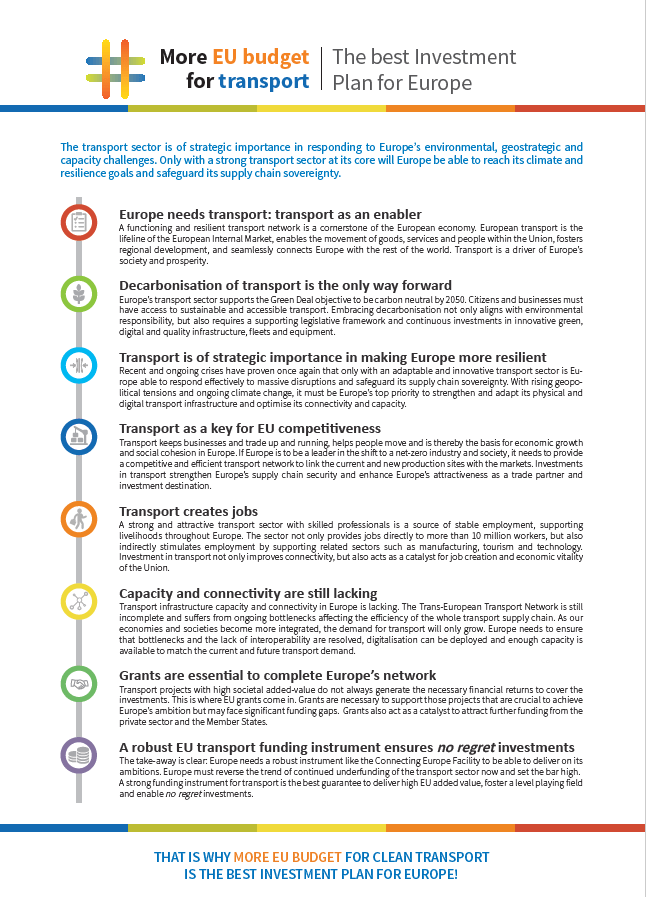More EU budget for transport
UNIFE, together with 44 European transport organisations, representing the key spectrum of Europe’s transport network and industries, are again joining forces in a campaign to urge the European Institutions and Member States to increase the Connecting Europe Facility (CEF) budget for transport in the upcoming EU Multi-Annual Financial Framework (MFF) 2028-2034..
The transport sector is of strategic importance in responding to Europe’s geostrategic, environmental and capacity challenges. Recent and ongoing crises have proven once again that only with a strong, adaptable and innovative transport sector at its core, Europe will be able to respond effectively to massive disruptions and safeguard its supply chain sovereignty. If Europe is to strengthen its resilience, be a leader in the shift to net-zero and finally complete the Trans-European Transport Network (TEN-T), it must translate its words into deeds and reflect these ambitions in the new EU budget for transport.
The massive oversubscriptions of the current CEF transport budget underline once again that the ambitions and challenges of the transport sector are high, yet are not met with the necessary EU support. The take-away for European leaders and policymakers should be clear: this is the moment for Europe to reverse the trend of continued underfunding of the transport sector and set the bar high. A strong CEF instrument for transport is the best guarantee to deliver high EU added value, foster a level playing field across Europe and enable no regret investments.
The leaflet of the CEF transport campaign for the review of the next EU budget is available here. The campaign leaflet will be officially handed over to the European Commission during the 2024 Connecting Europe Days on 4 April.
UNIFE Director General Philippe Citroën said: “The 2024 edition of the Connecting Europe Days is a very timely occasion to highlight the essential need for a stronger EU budget for the transport sector. With the launch of the revised TEN-T Regulation, the upcoming European elections and the work to prepare the next EU MFF 2028-2034 set to start already in 2025, UNIFE strongly believes that the EU urgently needs to reflect its climate ambitions with significant financial support. As the backbone of sustainable mobility, rail is the most environmental friendly mode of transport, only accounting for 0.4% of Europe’s total transport greenhouse gas emissions, which means the rail supply industry is perfectly placed to be a backbone of Europe’s future prosperity as a net-zero industry. Nevertheless, in a context of high-interest rates and scarce public resources, pursuing and increasing financial support to rail as part of European strategic investments to meet climate challenges, with a true level-playing field on the EU procurement market is urgently needed. In the next EU MFF, it will therefore be crucial to count on solid EU funding programmes such as the Connecting Europe Facility (CEF) to continue investing in TEN-T cross-border infrastructure, but also the digitalisation of rail through the European Rail Traffic Management System (ERTMS), Digital Automatic Coupling (DAC) and Future Railway Mobile Communication System (FRMCS) and zero-emission rolling stock.”
Should you have any questions, please do not hesitate to contact UNIFE Head of Communications Andrei Ciufu, via email at andrei.ciufu@unife.org or by calling +32 2 626 12 64.
Based in Brussels since 1992, UNIFE is the Association representing the European Rail Supply Industry at EU and international level. UNIFE gathers more than 120 direct company Members – from numerous SMEs to major industrial champions from all over Europe – active in the design and manufacture of rolling stock (i.e. trains, metros, trams, freight wagons) as well as rail signalling and infrastructure equipment. UNIFE also brings together national rail industry associations from 11 European Members States. For more information, visit www.unife.org or follow us on LinkedIn and X.
